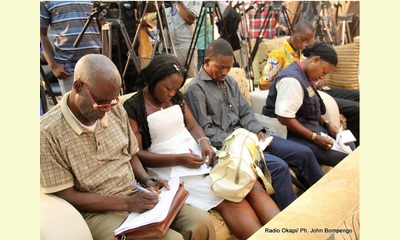|
|
Africa: Creating media channels to promote the culture of peace
an article by Radio Okapi, Fondation Hirondelle
How can we create media channels to promote
human values, such as the culture of peace? This
question was the focus of the presentation by
Patrick Busquet, national representative of the
Hirondelle Foundation on Wednesday, October 29 at
the International Women's Congress for the Culture
of Peace held in Oran, Algeria (See CPNN
October 30). According to Busquet, the head of
the Hirondelle Foundation (Democratic Republic of
Congo), the responsibility of media and individuals is
intimately fused. 
Journalists at the headquarters of the CENI in Kinshasa on 6/12/2011, when publishing partial results of the 2011 presidential election in the RDC. Radio Okapi / photo by John Bompengo
click on photo to enlarge
Thanks to the new technology, about 4 billion people
have gained access to the media.
Even if we consider that the media guide human
behavior and the future of humanity, their content is
ultimately a response to people's expectations,
Patrick Busquet explained. "We are used to thinking
about the way that the media influences us. This is
true. But this is not the only circuit of influence. We,
too, are influencing the media. And we have more
influence on the media than it has on us."
"Each human being has stored in his experience, a
lot more negativity than positivity. And this mental
formatting occurs in each of us, both in everyday
conversations and in media productions because
both are produced by us as humans."
It is the responsibility each person to spread positive
content and useful experiences that participate in the
construction of the world, and thus in a culture of
peace.
It is therefore up to us to make the media a positive
tool for the construction of society, he said.
According to Patrick Busquet, when individuals are
better informed, they can force the media to create
more positive types of content. The media would be
required to do this in order to keep their audience
and markets.
It is in pursuit of this ideal that the Hirondelle
Foundation has just installed several media in Africa:
Radio Okapi in Kinshasa, Radio Ndeke Luka in
Bangui, the Tamani studios in Mali, Mozaïk in Ivory
Coast, and Hirondelle in Guinea.
Radio Okapi, for example, is the most successful
media in the history of the United Nations. It extends
beyond the borders of the Democratic Republic of
the Congo, providing a signal of humanity, says
Patrick Busquet.
These accomplishments show that it is possible to
achieve the goal of media channels dedicated to the
promotion of human values.
(Click here for a French version of this article)
|








|
DISCUSSION
Question(s) related to this article:
African journalism and the culture of peace, A model for the rest of the world?
* * * * *
Latest reader comment:
CPNN continues to find that African journalists give priority to culture of peace news, unlike media in much of the world that give priority to violence. Here are some of the articles published previously:
Journalists from Northern Cameroon Reinforce Communication for Peace
Culture of Peace Featured in Most Recent Issue of Afrique Démocratie
Launch of the network of journalists for peace and security in Africa (Netpeace)

|
|









